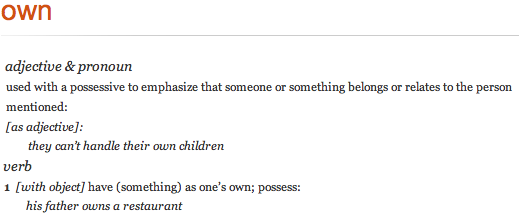After examining the word own in the dictionary, I'll discuss a dissenting opinion, and concede he has a point. When own is used as an adjective, it means something belongs to a certain individual, but when own is used as a verb, it means to possess.

Sure, it's your email account; you alone use it, and you alone know the password. But technically, I think the account is owned by Google, not you. (If Google shut down gmail tomorrow, the account would vanish, and you wouldn't have any recourse). So, maybe it would have been more precise to refer to the account by saying "my own some.email account" (using own as an adjective) rather than saying "I own the some.email account" (using own as a verb).
In the end, this becomes a somewhat technical matter of ownership and possession in the virtual realm. You might own a domain name (because you're paying for it), but do you own a free account? Or does the host own it, and you merely use it?
All that said, it's a bit of a grey area, and some might argue that he's being overly picky and too rigid in his adherence to the strict dictionary definition.
In the end, I think I'd side with you and against your friend on this one. If to own means to possess, what does possess mean? NOAD says that possess means have as belonging to one. I would argue the account belongs to you, and therefore you own it.

